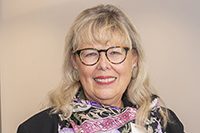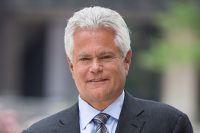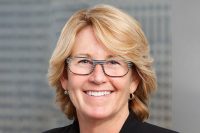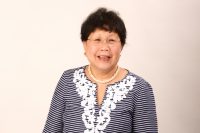
A 1979 John Marshall graduate, Paula Hudson Holderman’s impact on the Illinois legal community is unmistakable. In addition to her position with Winston & Strawn, during her career, Ms. Holderman held leadership positions with the Champaign County and Cook County State’s Attorney’s Offices, as well as numerous state and local bar associations. She has proudly served JMLS in nearly every leadership capacity imaginable, including President of the John Marshall Alumni Association from 1994—1995 and on the JMLS Board of Trustees from 2013—2019, serving as President from 2017—2019. The following is taken from a more than 60-minute conversation recorded on Zoom. We’re grateful for the time she offered to reminisce about her career.
Law School: You attended law school in the late 70s. What was your path to JMLS?
Holderman: I knew absolutely nothing about any law school, to be really candid. I was finishing up at the University of Illinois as an undergrad with a degree in French, and I had no idea what I was going to do. At the time, I was dating a guy who was taking the bar, and I was helping him study, quizzing him, and I realized I knew more than he did. So I just thought, ‘you know, I should go to law school.’ So I started applying. In those days, you had to pay an application fee. I got my John Marshall application done first, and I think the application fee was $35? To a senior in college with no job, $35 was…that was a lot of beer money back then! I started working on my other applications, but before I finished, I was accepted to John Marshall.
Law School: While you were a student, were there any professors or classes that really influenced your education?
Holderman: There were a few, actually. The first, though, who comes to mind was Professor Claude Carr. Many, many John Marshall graduates will remember him. He was just such a fascinating erudite, intellectual, charming gentleman, and he sort of fit my idea of what a true academic was. He was interested in history and other intellectual pursuits, and his home was filled with books and volumes, and he actually knew what was in them! I just found him fascinating. I loved his classes. I had him for Trust & Estates my first year. He called on me in one particular class, and I think he knew that I was not entirely prepared. He made me stand for the entire hour, questioning me and asking me about one estate case, and it spurred me on. I was never unprepared again. I also loved Estate Planning. I actually thought that that’s what I might go into…
[Carr] was a professor who socialized with students, and there weren’t too many of those. We used to hang out at this horrible place across the street from the Law School named Quincy’s Number Nine. It was well known for bad food and warm beer, but they had a pool table. That’s where we would go after class, and often Professor Carr would buy a round, and sometimes he was joined by Professor George Trubow.
Professor Schrager, who of course became Dean Schrager, was a mentor to me much later on. When I was teaching at John Marshall, I had an office next to his, and he took me under his wing. I still appreciate everything he did for me. During those years, he was President of the Chicago Bar Association, and he got me involved. That was one of the reasons I got involved in bar politics, and I’ve always been grateful. I also worked with Professor Ken Kandaras, who ended up being a good friend of my husband’s and mine.
One other gentleman I wanted to mention—and I hope a few people remember him—was a visiting professor named [Walter H.E. Jaeger], who was a constitutional law scholar. I had him for Contracts I. He was such an entertaining man. I think he was visiting from Georgetown? He was the editor of Williston on Contracts, and he hired me as a clerk. What a great experience for a first-year!
Law School: How did your education shape your career with the Champaign County State’s Attorney Office?
Holderman: Trial Advocacy was required at John Marshall in 1977—1979. As I mentioned, I thought I wanted to be an estate-planning lawyer, so I thought it was the dumbest thing in the world that I had to take Trial Ad. I was seven-months pregnant when we had our final trial [for class]. All the student lawyers had to bring family members to serve as jurors, and so my dad came. I think I’m probably the only student in the history of the course whose parent returned a verdict against them…
It was a criminal case, and I was prosecuting. I would stand up in order to object, but being seven-months pregnant, the judge was nervous that something was going to happen. Back in those days—42, 43 years ago—there weren’t a lot of expecting women in the courtroom. This guy was extremely nervous about me popping up every time to object so, he made me object sitting down. Trial Ad ended up having a huge impact on me.
When I became a Champaign County State’s Attorney, it was a relatively small office. They had about 15 lawyers and didn’t have anybody to do training. I had just gotten my letter from the bar when the State’s Attorney in Champaign County called. He asked, ‘Did you pass the bar?’ I said “yes, as a matter of fact, I did.’ ‘Well, do you want a job?’
I never thought I would be hired. They didn’t have any women in the office. But I started two weeks later, was sworn in, and the following week, I had a jury trial. But for my training at John Marshall, I would have had no idea what to do. And I actually did pretty well—won my first jury trial! So I’ll always be grateful to John Marshall and the Trial Ad requirement.
Law School: You returned to John Marshall in the ‘90s as Associate Director of the Center for Advocacy & Dispute Resolution and Director of Clinical Legal Education. What brought you back?
Holderman: This is a good story about networking… Peter McGovern was the Dean of the Law School in those years, and he was trying to reach out to alumni beyond the Chicago area. He contacted me down in Champaign County and asked if I would be willing to put together a group of alumni and do a reception. We kept in touch after that.
I married my husband, the Hon. James F. Holderman, who was a federal district court judge in Chicago, so I left Champaign-Urbana and the State’s Attorney’s Office and moved up north. I was networking with Dean McGovern, trying to find an appropriate position, and he said, “Well, you know we actually need some help in the Advocacy Center.” I interviewed with Professor Ken Kandaras, who was the Director of the Center, and got the job. That’s how Professor Kandaras and I became close friends.
Those are some of the best memories I have about the Law School—working with the students in Trial Ad and teaching in the Intensive Trial Ad Program. Professor Kandaras came up with that, which was unique to John Marshall. It was almost two weeks, every day, pretty much 9-5. We just drilled and drilled and drilled. We had an incredible faculty. I enjoyed that experience so much.
Law School: After you left the Law School, you ultimately joined Winston & Strawn. Aside from your extensive experience, what was your path to becoming Chief Attorney Development Officer?
Holderman: During my coaching years with the Center for Advocacy, I got to know coaches from other law schools, like Hon. Dave Erickson, who was the coach for Kent.
Dick Devine had just been elected State’s Attorney, and [Dave] was leaving the bench to join Dick as First Assistant in the Cook County State’s Attorney’s Office. They wanted to put more emphasis on training, and [Dave] wanted to know if I would be interested in interviewing for the job. Initially, I said no. I had just started working full time at John Marshall. But I met with Dick. He told me they wanted a more professional hiring process, and they were interested in diversity and recruiting. Those things are very important to me. Then Dave said, “Well, let me show you where your office would be…” It was a corner office on the third floor of the Daley Center, and frankly, it was just really nice. My office at JMLS was a remodeled elevator shaft.
I got to recruit at diversity bar association job fairs all over the country, and I was part of the Hispanic National Bar, the Cook County Bar, The National Black Bar Association… It really expanded my horizons, and I think it expanded the horizons of the Cook County State’s Attorney’s office, too. I learned a lot in that position, and it built on what I had learned at John Marshall, teaching and engaging with students at John Marshall.
Then the opportunity came up at Winston & Strawn, and I was there for 14 years until I retired. It was wonderful.
Law School: You were a student, then graduate, then employee of The John Marshall Law School, before returning as a member of the Board of Trustees in 2013. What brought you back to JMLS, and why was it important to stay involved as a member of the Board?
Holderman: In 2013, I was also President of the State Bar. A number of John Marshall grads have been presidents of the State Bar, most notably Leonard Amari. But it was actually Hon. Celia Gamrath, who I understand kept saying to Leonard, ‘We should get Paula on the board.’
The first year, I just tried to learn about the Law School and how the board operated and what was going on, etc. After that, I became more active and more energized, and I saw some needs that we could change for the better. I was very glad to serve on the Board of Trustees.
Then Leonard asked me to chair the new Dean Search Committee in 2016. It was a long process. It was an invaluable experience. To this day, I appreciate the leadership opportunity that gave me. It was a diverse group of perspectives. There were four faculty, a few alumni, the President of the Board of Visitors, and one student… It was a very, very fulfilling and challenging experience, but I think ended up being a very good one.
Law School: You then became the first woman to hold the office of President of the Board of Trustees in 2017. What did that meant to you and what were your goals assuming office?
Holderman: After observing the Board and the Law School for a year, I saw some areas where we could use some change for the better, and within the Board, as well, by the way. So I began to work on changing some policies. We were a very large body, so we started to decrease the Board size. We had some Trustees who had served on the Board for more than 30 years. They gave great service, but I thought perhaps we could benefit from some new ideas or perspectives. I also introduced term limits and established a policy of financial giving for Trustees.
When we hired Dean Darby Dickerson, she identified some areas at the Law School that needed some improvement, and so the Board worked hand in hand with her to implement some of those changes. I know some people might not always view them as positive. There are pros and cons to being an independent law school. The pros are that you kind of take care of yourself and you make your own rules, but I’m afraid the legal education business has become a heavily regulated industry—at the federal level, as well as the ABA, to some extent AALS, and the Higher Learning Commission.
The big recession hit, in like 2008, and it really started impacting the Law School. I think we found ourselves a little bit behind the curve. We were thinking about different avenues and opportunities to improve the Law School’s position, and certainly one of them was to merge with another law school. And then the UIC option became more serious a bit later. Obviously we know the result. That was not the goal when I became a trustee. Our goal was to improve the financial position of the Law School and to ensure the Law School’s existence and legacy.
Law School: What do you consider to be your biggest accomplishments as President of the Board?
Holderman: It’s not very sexy, but my biggest goal was to be in compliance with all of the various regulations. Culture changes take time, and there’s often resistance to change. But it was important for the continued existence of the Law School to make sure that we were in compliance with all the various rules and regulations.
The merger obviously was the biggest thing about my tenure. Now, you have a number of alumni who would consider that to be the worst thing that happened during my chair, but I would have to respectfully disagree with them. It was something that we needed to do to protect the legacy and resources of the Law School, to make sure that we could continue into the future and give non-traditional folks an opportunity to be lawyers, and to provide the community with practice-ready lawyers. I continue to believe that is a very, very important underpinning of our Law School—the importance of the professional experience, not just the understanding of law or the theory.
So yes, I would say the merger was the biggest moment of my tenure. It certainly was all consuming for me and Nick Zagotta. Nick was the Board VP and my co-negotiator on the deal. Most people probably don’t understand that it literally took three or four years for us to work through so many of the things that were involved.
The resources that we have now are substantial and being an independent law school is extremely difficult. There are only a handful left. It was something that we needed to do, and it seems to be working from what I can tell just maybe looking at the numbers. It looks like our LSAT scores are up, GPA is up, our enrollment is up…those things are important. Making sure that our faculty would continue. We were also very successful in getting the staff moved over, too. Those things were very important to us, because that’s truly people’s livelihood. We were making a decision—not just for us and for the legacy of the Law School and our alumni—for hundreds of people who worked there.
Law School: How would you describe the Chicago legal community and what role does John Marshall play in it?
Holderman: When I moved to Chicago after a decade in Champaign County, I was pleasantly surprised to find that while the Chicago legal community was a lot bigger, the sense of community was the same. It was so comforting and hospitable to have the John Marshall connection and to become involved in that alumni association which then led to other things. When I think back about my various positions, many of them were because of some John Marshall connection. I got involved in the Chicago Bar Association mostly because of Professor Schrager. I was already involved in the State Bar Association, but got more involved because of people like Leonard Amari.
John Marshall has a lot of leaders in the bar community, but also so many who have served the Cook County State’s Attorney’s Office, the Public Defender’s Office, and those who have served on the bench. We have folks with legal aid societies, pro bono organizations, people in all kinds of firms—small firms, solo, mid-sized firms, and large firms. People who teach at other law schools. Huge numbers of John Marshall grads give back.
We have had a huge impact within the Chicago legal community, but it goes far beyond Chicago, Illinois, or even the United States. It’s a very, very rich tapestry of folks all over the world, a part of the John Marshall experience.
Law School: What is the most fulfilling aspect of being a John Marshall law school graduate?
Holderman: It’s the personal relationships. For instance, [Former BOT President] Leonard Amari and Nick Zagotta, the Vice President of my board. They are two of my closest friends, and they were probably the only two non-family members who I saw during the pandemic, so it just shows you the bond that was created.



